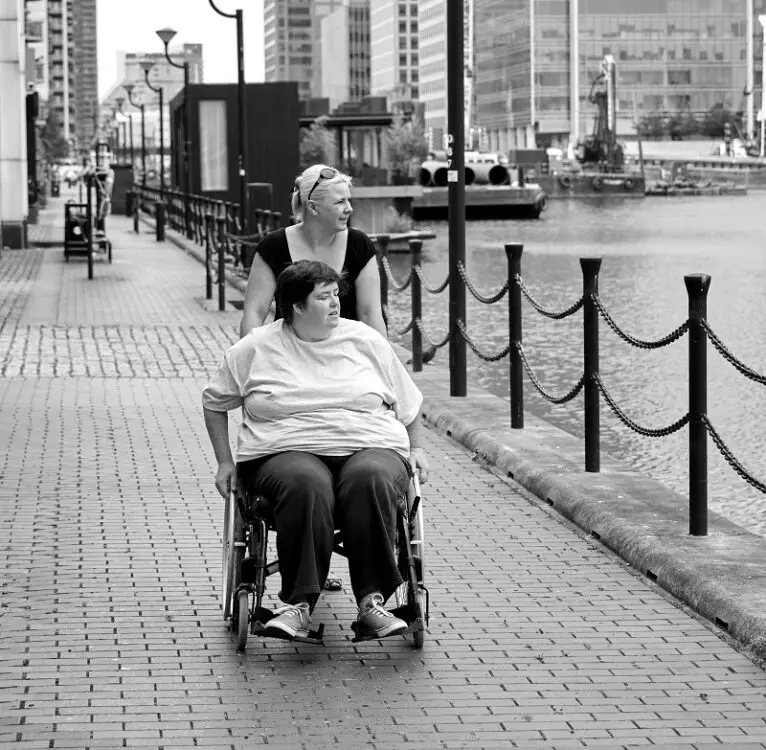
Top tips on employing your own personal assistant for care support
Employing your own care and support gives you choice and control about how you’re supported on a day-to-day basis. It also means that you become an ‘individual employer’ and are responsible for recruiting, managing and training your own personal assistants (PAs). This might seem daunting at first, but there’s lots of help out there.
Skill for Care has a practical toolkit to support people to become an individual employer. In this article, it teamed up with three individual employers to share their top tips to help you find and employ the best PAs for you.
Meet Claire – Claire uses a personal budget to employ her own PAs. She has a severe learning disability, communication difficulties and is autistic. Claire lives in a purpose-built bungalow, next door to her parents, with a team of PAs who support her 24/7.
Meet Christina – Christina lives in her own home and has employed PAs for 18 years. She currently employs four PAs who support her with a variety of needs, 24/7.
Meet Charley – Charley was born with Klippel-Trenaunay Weber Syndrome, a rare condition that causes muscle wastage, tissue enlargement and a blood disorder. She’s been an individual employer for seven years and employs a team of seven PAs called the ‘Charleyz Angelz’.
1. Write down your ideal PA
“I only recruit PAs who have the right values that align with my own. When I advertise for a new PA, I write a clear job description and person specification that reflects the role and the type of person that I need to employ,” says Claire.
When you’re recruiting for a PA, think about what makes your ideal candidate and include this in the job advert and description. Think about:
- their skills
- their values
- the jobs that you’d like them to do
- your own cultural and religious needs.
It’s important to take your time to find the right match, as Christina attests. “I have learnt that it is best not to take on a PA just out of desperation, as they may not work to my values,” she says.
2. Advertise for a PA in the right places
Research has found that word of mouth is the most successful way of recruiting a new PA. But there are lots of other ways you can advertise for a PA as well.
Claire has employed a team of PAs for over 10 years, and advertises for new staff using:
- Gumtree
- careers fairs
- your council’s PA noticeboard
- leaflets around your local community
- local support groups for disabled people
- social media, including Facebook and Twitter
- general recruitment sites, such as Indeed, TotalJobs and Reed.
Your direct payment or personal health budget adviser, as well as your local support organisation, may have other helpful suggestions.
 3. Do a thorough interview
3. Do a thorough interview
An interview is a good way to get to know someone who might work for you, so it’s important to ask the right questions.
To find someone that really matches her initial description, Christina asks people who are interested to fill in an application form. She also does an initial phone interview to get to know them, before selecting suitable candidates for a face-to-face interview.
When interviewing, Charley gives each applicant the same information and asks them the same questions so that everyone is given an equal opportunity. This means that she can easily compare their suitability. She also asks questions to find out what they’re like as a person and whether they’d fit in well with her team.
4. Give new PAs a good induction
When your PA starts you should plan an induction to explain what you want them to do, how you want things to be done and to introduce them to their workplace.
Claire uses the relevant sections of the Care Certificate, a set of standards expected for health and social care staff, to support induction, alongside other training.
“When a new PA starts, they learn about the ways that I want to be supported. New PAs shadow the trainer or manager for the first few weeks to ensure that they’re competent and feel confident to work alone. PAs can request extra shadowing time if needed,” says Claire.
Charley does something similar. After working alongside an experienced PA in the first week and being supervised in the second, they only start working independently by week three. During these early days, Charley gives regular feedback via email and face-to-face meetings. They discuss what’s going well and if her PAs need any more support, for example, further training.

5. Develop your PAs through training
Training ensures that your PAs have the skills and knowledge to do their job well and safely. Claire says that being committed to developing her team of PAs ensures that they are as happy as her.
She explains: “Each PA has a personal development folder to records all the necessary training that they’ve done and outlines any development needs they have. The team has done lots of training that’s personalised to my needs, such as Picture Exchange Communication (PECS) and Makaton sign language.”
To continually develop her PAs, Charley applied for funding through Skills for Care to pay for in-house training that’s tailored to her and her PAs needs.
6. Do regular supervisions with you PAs

Supervisions give you and your PA the chance to catch up on what’s going well and what isn’t working so well.
Claire says that these also help to maintain a good working relationship. She says: “For the first six months after they start, my PAs have a supervision every month. After this period, they have one every three months. They also have regular reviews, which scores them in the key areas of support.
This helps us to identify any areas for development. I encourage the team to give feedback in between supervisions and appraisals. We have a communication book where PAs can leave messages and ideas. The team also has regular staff meetings as well as a WhatsApp group.”
7. Manage your PAs and be a good employer
Christina wants to continue to develop herself as a great employer and attends ‘Good boss’ sessions with her local independent living council. This helps her to keep up to date with legislation, for example, employment law and payroll, and develop her own skills.
She told us: “As an employer, I know that I have high standards and always have a full plan for each shift. I try to be organised and on top of everything. I ask my PAs to do things the way that I would do them. This includes multi-tasking as we go along to clean and tidy small things that I have noticed.
I do want to get better at articulating my wishes more clearly and reduce my frustration. I need to spend more time with my PAs helping them to understand that what to them might be a ‘silly’ thing, for me is really important.”
8. Value your PAs and encourage open conversations

Charley strongly believes in looking after her team of PAs and shows that she values and appreciates them. When they’ve done a good job or go the extra mile she sends them a thank you card or an appreciation email. They also run an ‘employee of the month’, go on day trips and have a Christmas party where everyone gets an award for their hard work. She told us: “Making sure my girls have what they need is the most important thing.”
It clearly makes a difference, as one of her PAs highlights, “She fights incredibly hard to keep the care hours high enough to meet her care needs, whilst allowing the [PAs] the appropriate workload, without overworking us.”
From experience, Charley knows that making her PAs feels valued means they’re more likely to stay working with her. She said: “Allowing them to talk to me about their personal problems and being flexible with rota changes makes staff feel appreciated, and this means they will go above and beyond for us.”
Her PAs admire this approach and it helps them to perform better in their role. One of them said: “Knowing she is there to talk to allows us to deal with all problems and move forward in a positive way. Knowing that your employer cares boosts morale and helps encourage us to go that extra mile for her, as she does for us.”
Find out more
Skills for Care’s ‘Employing personal assistants toolkit’ guides you through the process of employing your own PA. It includes section and templates around:
- recruiting a PA
- before your PA starts
- managing your PA
- sorting out problems.
By Skills for Care
More on Disability Horizons…
I am interested to know whether you receive funding for training staff?
I receive Direct Payments from the council and I get no money to train staff.
I see that Charley takes three weeks to train people and this is great but I do not have the money to train people. Does anyone else have this problem?